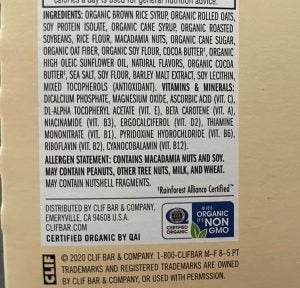If we have said it once, we have said it a million times — there are too many food labels in grocery stores! “Natural,” “Organic,” “USDA Certified Organic,” “Clean,” “No added hormones,” “antibiotic-free,” “cage-free,” and so many more. All of these labels throughout a grocery store can be overwhelming for those of us who know the difference, let alone for someone who is far removed from agriculture. For those with dietary restrictions from their doctor, they need to know what is in their food for their safety. For the rest of us, we want what is best for our families and those we love, but is bombarding the consumer with labels the best way to do it?
Walking down any given grocery aisle you will find products that have some type of label on it. While I typically try and shop around labels that are not supportive or have no relation to the actual product — looking at you, Non-GMO Project — sometimes it is hard to avoid. I might even miss it while shopping and not realize until I am unpacking groceries — just like I did on my latest grocery run.
While unpacking my Clif Bars (don’t come after me, I am a pregnant lady with a craving), I saw a label that was new to me, “Certified Organic — If it’s Organic, it’s Non-GMO.”

I was immediately disappointed I didn’t catch it in the store. Secondly, I was frustrated that consumers and the agriculture industry have to deal with yet another irrelevant label. At least, however, it isn’t straight-up lying: It is noting that because the product is organic, it is also non-GMO, according to USDA’s organic standards. That’s a given (at least in the modern genetic engineering definition of “GMO”), though it’s possible a lot of the public may not understand that.
This is a relatively new label, announced by Quality Assurance International (QAI) in March 2019, and it joins others like the USDA’s own National Organic Program label, the despicable butterfly logo, Certified Naturally Grown, and the Regenerative Organic Alliance’s efforts at a so-called “organic-plus” label.
QAI claims that one of their studies showed that 80 percent of participants were unaware that products with the organic seal were also non-GMO.
According to a USDA blog by Miles McEvoy, who served as the USDA’s National Organic Program Deputy Administrator, said, “The use of genetic engineering, or genetically modified organisms (GMOs), is prohibited in organic products. This means an organic farmer can’t plant GMO seeds, an organic cow can’t eat GMO alfalfa or corn, and an organic soup producer can’t use any GMO ingredients. To meet the USDA organic regulations, farmers and processors must show they aren’t using GMOs and that they are protecting their products from contact with prohibited substances, such as GMOs, from farm to table.”
Even though organic farmers cannot use GMOs in their operation, is the QAI’s label really required? The Clif Bars I bought already said non-GMO on the front packaging — in additional to the statement on the back saying “Certified Organic by QAI.” I always cringe at the upcharge these labels bring to the food products that I and other shoppers buy. But with how much some companies and industry lobbyists and activists have muddied the waters in terms of people’s understanding our food system and the safety of what we eat, it shouldn’t be surprising that people will pay more for a label that makes them feel good, even if there’s no real nutritional or health value to these distinctions.
As farmers and ranchers, we have the freedom to raise what we want, how we want. As consumers, we have the ability to purchase what we want and have the power of the dollar. However, when are marketing experts going to stop vilifying farmers for producing high quality food and make the consumer pay more for what they deem as “better”? The uncontrolled label market needs to be held accountable. As for this new label, add it to the list of attempts to “better” the consumer’s experience while shopping.



